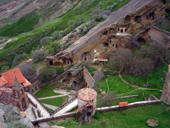
Gov’t continues talks, while clerics say Azerbaijan is making a road near the disputed area
By Gvantsa Gabekhadze
Monday, May 27
The Georgian government says that they are in talks with Azerbaijan to agree on the border, including the disputed area of Georgia’s David Gareja monastery complex in the country’s south-east, while clerics from Gareji say that Azerbaijan has already constructed a four-kilometer-long road and only 700 meters are left to one of the monasteries of the complex.
Clerics are pessimistic regarding the actions of the Georgian government and say that they and the public 'will protect the monastery complex,' in case the government 'finally fails to do so.'
The Georgian Foreign Ministry has urged the public to refrain from making such statements which might harm the negotiation process with Azerbaijan as the border is a 'very sensitive issue.'
After the collapse of the Soviet Union, Georgia has managed to agree on the border only with Turkey, while the issue needs to be resolved with Armenia and Azerbaijan.
The 12th meeting of the special committee working on Georgia-Azerbaijan border issues met in Baku last week with the leadership of Georgian and Azerbaijani deputy foreign ministers.
“It has been agreed that the commission members, together with experts, will view the disputed areas. They also agreed about studying the relevant legal and cartographic materials, related to the border,” the Georgian Foreign Ministry reports, saying that the date of the following meeting in Tbilisi was also agreed.
On 23-24-25 April, Azerbaijani border guards prevented clerics and tourists from entering the part of the Gareja monastery complex.
After negotiations between the Georgian and Azerbaijani officials, people were re-allowed to enter on April 26.
However, clerics say that after the incident, the number of Azerbaijani border guards has been increased to 17-18 men, while 'only two were patrolling the area previously.'
Azerbaijani border guards also closed the 6th-century site back in 2012 that was protested by the march of hundreds of Georgians to David Gareja, which ended by the re-opening of the site.
David Gareja is the monastery complex of 22 rock-hewn monasteries and more than 5,000 sanctuaries and cave-cells, located in Georgia’s south-east at the conditional border with Azerbaijan.


